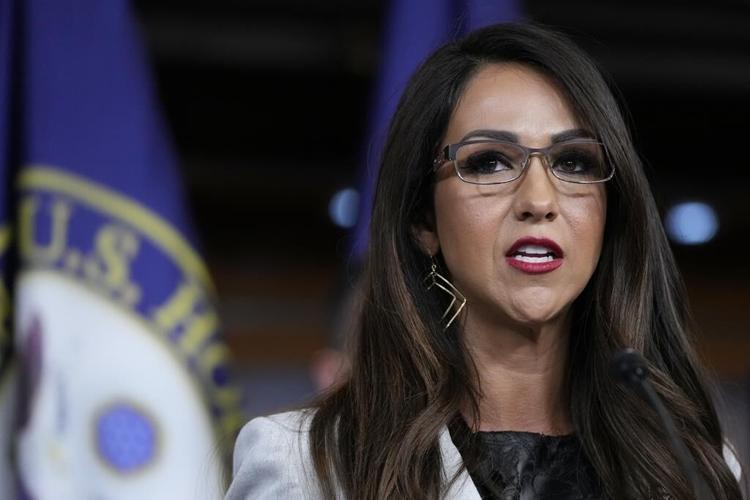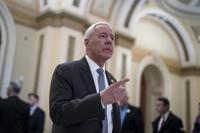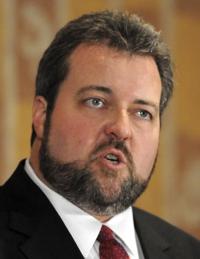DENVER (AP) ÔÇö A Colorado Republican panel made a surprising decision Thursday night, choosing a former mayor, Greg Lopez, to be U.S. Rep. Ken Buck's likely replacement until the November general election, a saving grace for Rep. Lauren Boebert's bid for another term in Congress.
Lopez will now run as the Republican candidate in the June 25 special election after at the same time GOP primary candidates are vying to be the congressman's successor.
The stakes, however, were far higher than keeping Buck's seat in the U.S. House warmed by a Republican.
Of the nine competitors who jostled for the special election nomination, seven also are running in the primary race against Boebert. The far-right congresswoman in the seat she currently holds.
While Lopez is likely to win in the dark red district, he will be a placeholder and plans to step down after the general election winner is sworn into office in January. For two of Boebert's primary opponents who came in second and third, the special election candidacy would have been a boon.
They would have run in two different elections for the same seat, garnering more attention, media coverage and fundraising opportunities. That would have boosted their odds in the primary race where they are otherwise eclipsed by Boebert's near household name and hefty campaign chest.
That tension was palpable throughout the six-hour meeting with six votes on Thursday, which winnowed the field in the special election for Buck's seat to two options, Lopez and former state Sen. Jerry Sonnenberg, one of Boebert's stiffest primary competitors.
Throughout the evening, there were accusations Buck had intended to kneecap BoebertÔÇÖs campaign by stepping down early and giving one of her opponents a potential leg up. Boebert pushed the claim, saying in a previous statement, "The establishment concocted a swampy backroom deal to try to rig an election.ÔÇŁ
Buck denied that was his intention.
Boebert sent a letter to delegates prior to the meeting encouraging them to choose a placeholder, so as not to ÔÇťinfluence the regular primary election in a way that would taint the entire process and give this candidate an unfair leg up.ÔÇŁ
That riled her primary opponents, including former state Sen. Ted Harvey.
On stage, Harvey lashed back at those who voted for Lopez after landing the third most votes.
ÔÇťThey didn't do it to support the candidate Greg Lopez, they did it to support their own candidates who weren't here tonight. That's not just putting us at risk, but it's putting our nation at risk,ÔÇŁ Harvey said.
Harvey then asked his supporters to throw their weight behind Sonnenberg, one of Harvey's primary opponents. Sonnenberg barely lost to Lopez in the final vote and seemed to shrug off the loss.
ÔÇťThis is not a game for the weak, I understand completely, they made a decision," he said, gesturing toward the mingling crowd.
Lopez is a former mayor of Parker, Colorado, who ran two unsuccessful bids for governor and said he will ÔÇťdo the best job that I can and represent this state to the best of my ability.ÔÇŁ
This helps keep the field clear for Boebert, who has built a far-right name with a ferocious political style and remains a known, if divisive, quantity among conservatives nationwide.
While Boebert has made headlines with scandals, including a tape of her in a Denver theater, she also has garnered endorsements from former President Donald Trump and current Speaker of the House Mike Johnson.
Those votes of confidence will likely go far for Boebert in the new district, an expansive sweep of Colorado's plains where voters overwhelmingly supported Trump in 2020 and her opponents are lesser known, local Republicans.
The committee convened at the fairgrounds in Hugo, Colorado. It's a small town of some 800 people, but legend and photos hold that then-President Theodore Roosevelt stopped there to share a meal with cowboys at the turn of the 20th century.
Boebert moved east to join the race in this district at the end of last year, after she nearly lost her previous, Republican-leaning seat to a Democratic candidate in 2022.
The slim margin raised questions of whether her Trumpian style still had purchase among GOP voters. After the Democrat who nearly beat her went on to far outraise her for an expected 2024 rematch, the congresswoman switched districts.
The move incited grumblings about political maneuvering, with some of Boebert's homegrown primary opponents accusing her of ÔÇťcarpetbagging."
She defended the move by saying her voice is still needed in Congress and her exodus from the old district makes it easier for Republicans to retain the seat, and therefore their majority in the U.S. House.
The option to district hop was opened to Boebert after Buck announced last year he wouldnÔÇÖt run for reelection, citing his party's handling of Trump.
Buck abruptly resigned and left Congress on March 22, pointing to the ÔÇťbickering and nonsenseÔÇŁ he said now pervades the U.S. Capitol.
___
Bedayn is a corps member for the Associated Press/Report for America Statehouse News Initiative. is a nonprofit national service program that places journalists in local newsrooms to report on undercovered issues.












































